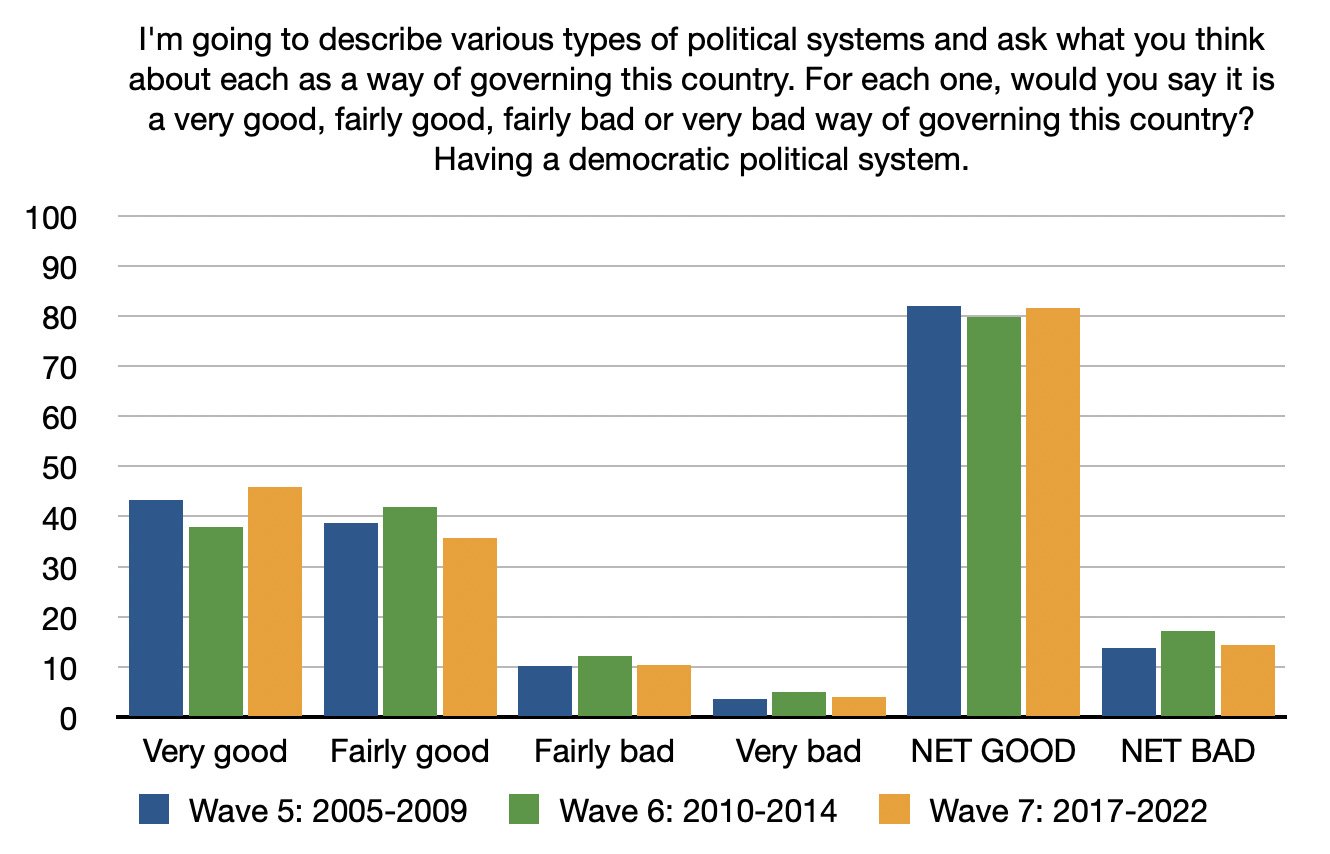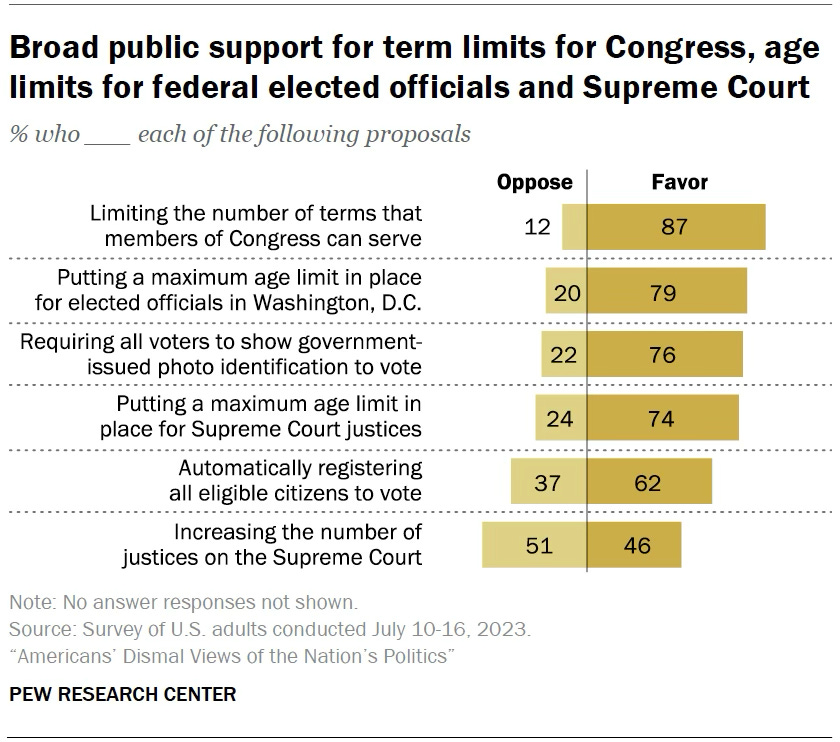Democracy Is In Decline
Americans wish it weren't
This week we had Richard Wike and Patrick Moynihan from Pew Research on to talk about Democracy. You can listen to the show here:
There is a lot of signal that people in democracies are not happy with how their democracies are functioning.
But there is not nearly as much evidence that people don’t care whether they are governed under a democracy, or prefer autocrats, as there is evidence that what people want is for their democracies to be more democratic.
Yascha Mounk and Roberto Foa wrote a paper in 2016, “The Danger of Deconsolidation” in the Journal of Democracy. Drawing from the World Values Survey, they focused on a few key measures from that survey, which you can see in 4 charts.
When this piece came out, it struck me as alarmist. And in fact, it’s not an entirely accurate picture.
What the World Values Survey Says
The first chart is drawn from a question that never uses the term “essential” at all. Instead, respondents were asked, “How important is it for you to live in a country that is governed democratically?” 1 is “not at all important” and 10 is “absolutely important.”
So I pulled that data for the US across the waves cited in Mounk & Foa’s paper and a more recent Wave 7.
While you’d hope more than half of Americans would select a 10 on this scale, there hasn’t been much movement over these waves. But scales are funny creatures — people tend not to have linear relationships with their opinions. If we collapsed these ratings, taking a 1-4 response as “not that important”, a 5-7 response as “neither important nor unimportant”, and a 8-10 response as “pretty important”, then the chart looks like this:
This version might be more concerning. The number who say they’re not bothered is flat or slightly up. The number who say it’s very important is down a bit.
Let’s look at the topline numbers for the second question they investigated, which asked, “I'm going to describe various types of political systems and ask what you think about each as a way of governing this country. For each one, would you say it is a very good, fairly good, fairly bad or very bad way of governing this country? Having a democratic political system.”
The number of people in a democracy who say it’s fairly or very bad went down after Wave 6. The number of people who say it’s very good went up quite a bit in the latest wave. Vast majorities generally think it’s good to have a democratic political system. The number who think it’s generally bad decreased in the most recent wave.
Now we can look at that political apathy number again. We’ll look at the gap simply by comparing people who pay attention to people who don’t. On this measure we again see modest improvement in engagement with politics in the US in the most recent wave — and depending on how you want to cluster these, the net interested v net not interested shows interest prevailing.
So we turn to the fourth chart in Foa & Mounk’s paper, about the appeal of authoritarianism. The question in the World Values Survey is phrased like this: “I'm going to describe various types of political systems and ask what you think about each as a way of governing this country. For each one, would you say it is a very good, fairly good, fairly bad or very bad way of governing this country? Having a strong leader who does not have to bother with parliament and elections”:
This number is concerning. The net good number has gone up; the net bad number has gone down. But remember: the question never says “authoritarian” — it says “a strong leader who does not have to bother with [Congress] and elections.”
Pew Research Has the Context
Pew Research Center’s Richard Wike and Patrick Moynihan are my guests on the show this week. The question they are trying to answer is not, “Do you like democracy?” It’s “How satisfied are you with the way democracy is working in your country?”
In March 2020, they released a survey showing 46% of Americans were somewhat or very satisfied with how our democracy is working. By the spring of 2024, that number had fallen to 31%.
Pew’s work illustrates what is driving this decline in satisfaction — it’s a combination of economic inequality, a distaste for candidates who seem to be neither representative of their constituents nor responsive to their needs, frustrations with the policies and actions of the political parties, and structural elements of our democracy that impede our sense of small-d democracy.
But Americans also support reforms that would make democracy more representative:
People do know what makes a democracy democratic, and they do know institutions, policies and politicians are failing to deliver.
Their intuition, by the way, is really very good. When you compare their concerns with the elements that Freedom House, for example, uses to evaluate a country on its level of freedom, the same things that drive our score down are the things Americans say they are frustrated by when it comes to our democracy.
The slope is getting steeper
This week has been overwhelming — the pace at which the executive branch of the federal government can institute deeply undemocratic practices and policies and the degree to which members of the legislative branch (which is, according to the Constitution, the branch that makes laws, allocates money for federal government spending, declares war, can expand the number of Supreme Court justices and limit their jurisdiction, can vote to override Presidential vetoes, and gets to say who is in his Cabinet) will simply… let them.
I’ve heard at least as much this week about how mad people still are at Biden as about how Elon Musk — who holds no official office in the United States — seized power to demand the resignations of career and confirmed civil servants and the workforce at large. He demanded access to the federal government’s payment systems. By any objective measure, we should understand this to be a coup. Congress should be taking measures to remove him, sanction the President, and instruct the agencies to do as they were bidden by Congress.
But it also emerged today that a district court injunction against the OMB’s massive cuts to grants and other disbursements from the federal government had been ignored by the Trump administration. This is lawless.
The problem is not the people, who have become too wishy-washy about democracy. The problem is a system that could allow an executive branch power grab of this magnitude, and that could allow a private citizen to be de facto running that branch.
If Americans are dissatisfied with the way the government is working, and wish that someone would have the strength to stand up and oppose this hostile takeover and propose something more democratic, more fair, and more responsive, they are right.













